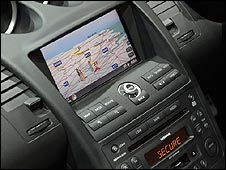
Satnav is used by millions of drivers as well as emergency services
|
Ministers say further research is needed before a navigation system dating back to the Second World War can be used as a widespread back-up to GPS.
MPs were warned this week about the vulnerability of GPS to jamming by terrorists intent on crippling vital infrastructure.
They were told LORAN, a radio-based maritime navigation aid, could be used as a more robust back-up.
The government said Loran had potential in this role but needed research.
A spokesman for the Department for Transport (DfT) said: "Enhanced LORAN (eLORAN) has the potential to be used by non-maritime applications but further research needs to be done if benefits are to be realised.
"Following the successful trials, the DfT has agreed to contribute around £0.5m to the General Lighthouse Authorities' procurement of an eLORAN service."
Higher accuracy
Satellite navigation underpins much of the world's infrastructure, including financial markets, telecoms, power generation and distribution as well as transport and the emergency services.
But the signal from the satellite is weak and easily jammed and is vulnerable to interference.
Some experts are now pressing for LORAN to be developed as a back-up.
Dr Sally Basker, research director of the General Lighthouse Authorities, which operates a radio navigation station in Cumbria, said Europe was the only part of the world not now developing enhanced LORAN to protect infrastructure.
In February, the US Homeland Security department announced it was investing in it was developing an eLORAN system to back-up GPS.
Stronger signal
LORAN was originally developed during the Second World War as a maritime navigation aid and is based on the principle of the time difference between signals from a pair of radio transmitters.
Its modern version, known as eLORAN, delivers higher accuracy, integrity and continuity.
Its signal is much stronger than from a satellite, enabling its signal to be received indoors and even - to a limited degree - underground.
It could potentially provide a more reliable positioning and timing signal and is less vulnerable to accidental interference and jamming.
On Wednesday, Doug Umbers, whose firm VT Communications landed the 15 year contract to run the GLA's eLORAN service, explained to MPs how it could be used as a back-up to GPS.
"GPS is quite jammable - very easily jammable," he told the defence committee, adding that a pen-sized device could "stop ships in a port being able to receive GPS".
But, he added, "you need a huge field of transmitters" to jam Loran. It was "highly resilient and mission critical clearly, for the maritime market, and could also have uses elsewhere".
Hand-held GPS jamming devices, aimed at drivers worried their cars have been fitted with tracking devices, are available to buy over the internet.
Jamming trials
The Ministry of Defence last year carried out a series of GPS jamming trials to find out how interference could affect military personnel.
In one test it jammed GPS over a 50 square mile area of Cornwall over two days, warning emergency services and coastguards in advance.
In a statement issued at the time, it said: "Although GPS provides highly accurate information, the radio signals from the satellite are extremely weak and are susceptible to both jamming and unintentional radio interference.
"The trials are taking place to better understand these effects on military equipment and therefore will help to protect our forces."
July 7 attacks
The Commons defence committee, which is investigating UK national security and resilience, quizzed a panel of five defence industry experts at its evidence session on Tuesday.
Tony Baptiste, of Fujitsu UK, said the electronics giant was trying to interest the British government in an emergency radio system, of the type used by the US authorities during the Hurricane Katrina emergency.
He said the system - which involves dropping radio and CCTV receivers and transmitters into tunnels - could have been used after the 7 July bomb attacks, when the emergency services found they could not communicate underground.
All five industry experts being quizzed spoke of the difficulty of finding a single point of contact for anti-terrorist procurement in the government.
But they also agreed that a new Homeland Security department, of the kind set-up in the US, was not necessary as the disruption caused while setting it up would cancel out any advantage.
|
Bookmark with:
What are these?